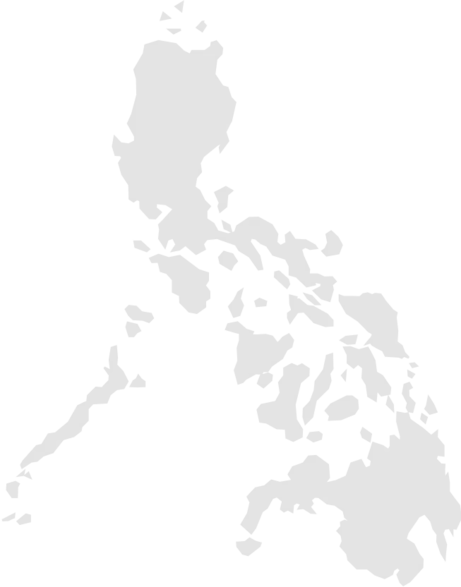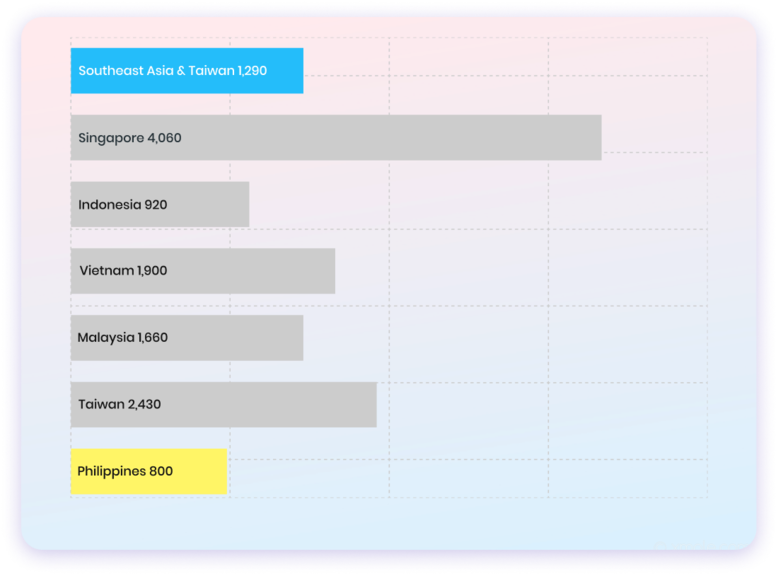


Glints Hiring Guide
Browse our hiring guide to learn more about the talent landscape, local labor laws and hiring best practices in The Philippines.

CAPITAL
Manila

TIME ZONE
Philippine
Standard
Time UTC +8

CURRENCY
Philippine
Peso (PHP)

LANGUAGES
FIlipino, English

EMPLOYERS TAX
13.5%

PAYROLL CYCLE
Bi-Monthly

The Philippines continues to be a top-tier destination for global business outsourcing because of the its high-volume, cost-effective transactions, and high fluency in the English language. Filipino tech talent are likely to join organizations that show high process efficiencies, continuous talent improvement/development, and an empowered, accountability-driven culture.
Tech roles in demand
Full Stack Developer
Sales Development Representative
Account Manager
Business Development Executive
Product Marketing Executive

The Philippines has the lowest median salary as compared to the rest of the Southeast Asian countries. It's also one of the most favored when it comes to remote talent because of their high proficiency in the English language.
Popular jobs and median monthly base salary
The Philippines has become the favored location for Australian, UK, and US companies seeking skilled remote talent. There is also high demand from tech companies in Singapore, Japan, and Germany.
Median Monthly Base Salary (in PHP)
Median Monthly Base Salary (in USD)
Full Stack Developer
109,860
2,040
Sales Development Representative
37,700
700
Account Manager
68,390
1,270
Business Development Executive
114,710
2,130
Product Marketing Executive
92,630
1,720
Monthly Base Salary
PHP 41,820
USD 750
PHP 50,600
USD 907
PHP 48,890
USD 880
Data Scientist
PHP 56,200
USD 1,001
Business Development & Sales Executive
PHP 33,840
USD 610

Looking to build teams in The Philippines? Browse more jobs and salaries in our free salary guide to keep growing.

Filipino culture is one that embodies Asian values with a mix of Western culture. Having a country that historically deals with both the East and West, they are well adept in cross-cultural settings.
Titles and nicknames
Titles are the norm in the Philippines. No matter where you are, you’ll hear someone calling another person “Ate”, “Kuya”, “ma’am”, “sir”, etc. These titles apply in both casual and professional settings, so it’s normal for a subordinate to call a superior “Ma’am” or “Sir”.
Importance of pride
Being ‘hiya’ or ‘mahiyain’ is a Filipino value that puts great emphasis on how others see you. Needless to say, modesty and pride are a big deal in Filipino work culture. Staff value their reputation in the workplace and would prefer not to be embarrassed in a public setting.
Effective in bridging cultures
Filipinos have an affinity to Western culture, while maintaining their strong Asian identity. This familiarity with different cultures can be traced to the nation’s long history with both East and West. Filipinos interact with tourists and foreign professionals on a daily basis. They are also no strangers to outsourcing. Thus, most can communicate effectively in a cross-cultural setting.
Strong service orientation and hardworking
Exhibiting a rich and varied work culture, Filipinos have a reputation for being hardworking. Employees are disciplined, highly productive, and flourish best in an environment with high-quality internal structures and processes.
They are also renowned for their amazing work ethic and are eager to demonstrate their productivity. Additionally, the concept of ‘kapwa’ (fellowship or togetherness) is deeply ingrained in the core values of the Filipino people. In the collectivistic nature of Philippine society, 'kapwa' refers to the shared identity between groups of people as they bond together despite their differences in wealth and social status.
In the Philippines, it is acceptable to have verbal employment agreements – but it’s best to have terms written down in both English and Filipino. Unless otherwise stated in the employment contract, employment relationships are considered permanent (though fixed-term contracts are still possible). These contracts outline key terms including job scope and requirements, code of conduct, as well as company policies.
The Department of Labor and Employment (DOLE) enforces employment laws in the Philippines. Most of employment law is based on the Labor Code of the Philippines, while employment benefits and standards are derived from the Social Security Law, the National Health Insurance Act, the Sexual Harassment Law, and the Comprehensive Dangerous Drugs Act.
Contract
Holidays
Benefits
Insurance
Payroll
Bonus
Taxes
Termination

Hiring the right talent and building great teams in Southeast Asia and Taiwan can be quite a daunting task. You’ll need a deep understanding of the local talent pool, their skills, culture, and employment laws — among others.
The hiring process is often tedious, time-consuming and costly without the right approach. With Glints’ end-to-end talent solutions, you’ll have a trusted partner to lean on at every step of the hiring journey, so that you can scale up your business with peace of mind.
Not sure how to start hiring in The Philippines? Schedule a no-obligation consultation with our experts today.